#Burnout Stress Management Program
Explore tagged Tumblr posts
Text
If you have a depressed mind and is suffering from burnout your best way to recover is to talk to more people every day. You can also involve in physical activities such as taking a sport and practicing it every day. Burnout stress management program is offered to sufferers and are exclusive to each person. Read more about us.
0 notes
Text
#Corporate Wellness Solutions#Workplace Wellbeing#Employee Wellness#Mental Health at Work#Workplace Wellness#Healthy Workplace#Wellness at Work#Employee Engagement#Work Life Balance#Wellness 2025#Corporate Wellness Programs#Workplace Health#Employee Benefits 2025#Workplace Productivity#Remote Work Wellness#Stress Management#Workplace Fitness#Healthy Work Environment#Wellness Technology#Workplace Burnout#Corporate Wellness Programmes#Workplace Wellbeing UK#Employee Wellness UK#Mental Health at Work UK#Workplace Wellness UK#Healthy Workplace UK#Wellness at Work UK#Employee Engagement UK#Work Life Balance UK#Wellness 2025 UK
0 notes
Text
Mental health supports for teachers - what should it look like
Teaching is one of the most rewarding professions, but it is also one of the most emotionally taxing. Teachers often juggle a plethora of ever-increasing responsibilities, from managing classrooms to meeting administrative demands and fostering student well-being. This can leave them emotionally drained, leading to stress, burnout, and mental health challenges. To address this, meaningful mental…
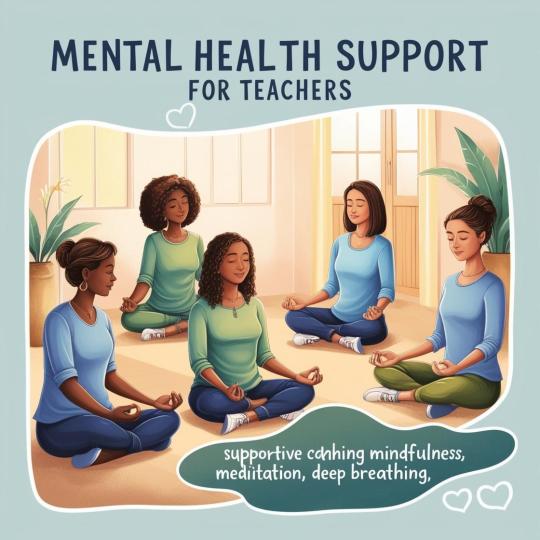
View On WordPress
#Counseling services for educators#Educator wellness strategies#Mental health resources for teachers#Mindfulness for Teachers#Preventing teacher burnout#Professional development for teacher wellness#School support for teacher well-being#Self-care tips for teachers#Stress Management for Educators#Teacher mental health programs#Teacher mental health support#Work-life balance in teaching
0 notes
Text
The Impact of Resilience Programs on Employee Wellness in High-Stress Industries

High-stress industries, like those of emergency services, health, and finance, push employees very hard indeed. Such intensities in the workplace may result in high levels of stress and, subsequently, burnout. In light of this fact, many organizations are now turning to organizational resilience training programs to help and support employees with wellness.
Ultimately, these programs aim to enhance productivity in general.
The Importance of Organizational Resilience Training
The resilience training for an organization is significant in the aid of employees with professions of high stress. It provides strategies that enable individuals to adjust and recover from the stress caused by their job. These strategies range from techniques of monitoring stress to mindfulness and cognitive-behavioral approaches. With the equipped strategies, employees learn to bear stressful situations.
The training on Organizational Resilience builds long-term resilience in addition to dealing with immediate stress. It helps employees to confront future adversities without being wary of them. Consequently, it gives organizations an effective workforce able to work under pressure.
Organizational Burnout Training
Burnout training for an organization is an essential constituent of a resilience program. Burnout is a very grave issue in high-stress surroundings: besides emotional exhaustion, the depersonalization process may also reduce personal accomplishment. In this regard, organizations that invest in burnout training show employees the signs of burnout and how to take care of it.
Burnout training generally consists of workshops and seminars on workload management, work-life balance, and building coping resources. This offers practical resources for the employee to handle stress in a manner that will help to prevent burnout. Companies that provide training in burnout experience reduced employee absenteeism and increased productivity and efficiency.
Implementing a Resilience Program in High-Stress Industries
There is an element of resilience within the context of a high-stress industry. For example, an analysis of specific stressors that are affecting the employees can always help in tailoring a general program of resilience that can best deal with issues.
The training can incorporate burnout training into the resilience program. The combination indeed includes employees in what they need by taking a very holistic approach. The initiative could also include wellness programs, such as mental health resources and stress-management workshops. Regular feedback from employees can enhance, refine, and strengthen the program.
The need for a resilience program in India grew. Most of the time, a resilience program includes practices that are culturally accepted and address local stressors. In such a way, it is guaranteed that this program corresponds to the peculiarities of Indian employees' needs, and therefore, it could be more effective with respect to employees' wellness.
In-Measurements of the Programs
Let the effectiveness of programs be met with ease by organizations through the use of clear metrics and methods for evaluation. The KPIs that are commonly used include less absenteeism, less stress levels, and more employee satisfaction. Surveys or feedback sessions contain insightful information about how effective the program is and areas for improvement.
Productivity and employee engagement are some of the ways in which changes can be tracked to evaluate the success of the program. A good program translates into better engagement and motivation on the part of the employees, which results in better organizational productivity.
The Future of Resilience Programs
With the changes in the workplace, several functions of programs bring new meaning. High-stress industries consistently face extraordinary challenges; programs provide support to the employees' well-being. Companies that support these programs have outstanding records of retaining talents and thus reduce their turnover.
Employee programs may be more integrated with all other employee wellness programs. This kind of approach supports overall for the employees in their mental and physical wellness. A comprehensive wellness program will increase the level of overall organizational success and satisfaction among employees.
You may also read:
What Diet for Stress Management is Best to Build Students Resilience
Resilience Program for Students: Building Mental Strength for Success
Conclusion
A Resilience program in a stressful workplace can make a difference. Organizational Resilience Training, given other general burnout training for organizations, helps nurture capabilities among employees in handling stressful situations and prevents burnout. Organizations invest in the Resiliency Program to help build resilience among employees.
#organizationalresilience#burnoutprevention#employee wellness#resiliencetraining#workplacewellness#stress management#employeesupport#wellness programs#burnout recovery#worklifebalance#stressrelief#resiliencyprogram
0 notes
Text
I have the urge to write a seven-season-long medical drama, so here is a concept for Top Gun Hospital AU with ER hate-to-love hangster AU that no one asked for.

as a warning: this is a bit incohesive and silly
All the aviators are doctors and all the WSOs are nurses. With the exception of Bradley (but there’s an explanation for it).
Mav — cardiothoracic surgeon; Ice — former neurosurgeon and Chief of Surgery, current Head of Patient and Medical Services (so, entirely admin). I imagine they have the same kind of relationship as House and Cuddy in this, including Ice keeping an entire legal team for Mav’s unconventional practice methods. They've met during med school and had been rivals up until they both finished general surgery residency. Slider is an OR nurse turned anesthesia nurse. Goose was an ER nurse and met Mav during his rotation as a med student and died after an incident in the ER during Mav’s residency (that was the moment he switched from emergency medicine to surgery).
Phoenix — emergency, but she managed the impossible (like Mav) and switched from obgyn residency after the first year (only chose obgyn in the first place because of her mom, a renowned obgyn in Oregon), she's still really passionate about the obgyn field but didn't enjoy the work enough to do it for the rest of her life; Javy — general surgery; Payback — emergency with sub-spec in pediatrics; Friz — respiratory medicine; Omaha — oncology; Yale — ortho surgery.
Bob — a former OBGYN nurse, left because of a toxic work environment, working in the ER six months now, Phoenix's favorite nurse now, duh; Fanboy — started in peds oncology, had to switch because it was too hard on him mentally and is now peds emergency; Halo — started as a palliative care nurse, switched to oncology after a few years; Harvard — OR nurse, switched from general team to ortho
Hangman is the new trauma surgeon starting in their ER. Born and raised on a ranch, was expected to take over the ranch but never wanted to. Thankfully, he had too perfect grades to not send him to college — his parents wanted him to be a vet, which obviously didn’t happen, so he could stay close to the family business. He moved to California for his MD. He has terrible bedside manners with patients and patients’ family, but is surprisingly decent with kids, has lost respect for nurses sometime during his first residency year, and had a terrible case of Ego hit him during his trauma surg fellowship.
Now, about Rooster:
Bradley got into a pre-med program, Mav (who had set up Bradley’s college fund) said he’s not going to pay for it since he doesn’t want Bradley to be a doctor (long hours, lack of work-life balance, burnout, high stress, etc. It was more complicated because Mav still has the Goose trauma). So they had the fallout, Bradley moved out and deferred college to find a way to pay for it and, wanting to gather hospital experience, started working as a CNA in Peds ICU at a children’s hospital which accidentally was having a new CNA intake at the time. He liked it, actually loved it, and started hesitating whether he should continue with pre-med and be like Mav or go for nursing, like his dad. Year after, he got an offer from the hospital that said hey, we’ll fund some of your BSN as long as you work for us while you study and then work for us for another four years after getting your license. So he became a nurse, got certified as peds nurse after working two years in PICU and after another three, switched to the Pediatric Rapid Response Team, where he stayed for another two years before getting a spot as a senior nurse in adult/peds ER in a different hospital.
His relation to Mav and Ice only came to light a few months after the hiring process, as Bradley didn’t even know they worked there when he applied and it’s still a hash-hash topic in the ER. He’s been in the ER for almost three years now and has become an unofficial second-in-command as one of the few with substantial experience.
I imagine he’s definitely one the best nurses you could have as a patient — he’s honest but in an empathetic way, he’s worked in the most demanding environments with the most complex patients (ICU and RRT), he’s skilled and experienced in most procedures. Because he is one of the few male nurses, he’s the one dealing with inappropriate patients, aggressive patients, patients that need restraint, frequent flyers, etc. and he genuinely doesn’t mind — he is the perfect mix of calm and firm that makes him very reliable in most difficult situations. He is absolutely most reassuring and guiding with new stuff, be it new nurses or med students that don’t know what’s happening, and he doesn’t judge. It does help, too, that he was partially raised by two very cocksure surgeons and therefore knows how to deal with doctors that turned a bit too arrogant.
Before I go to the hangster part of this shit, I want y’all to know it all started because I found this Rooster-coded scrubs:


I imagine that he buys most of his scrubs since the work-issued scrubs don’t fit well on men (most unisex ones are very much just female fit stamped with unisex label) and peds nurses can have lots of cute ones so the kids feel less nervous around them
Also, this is a warning that yes, Bradley is trans in this scenario, too, because I said so. It's relevant to a few scenes, I think?? and there's tw for transphobic OC
Now, a bunch of scenarios I can see for this AU:
On the first day at his new workplace, Jake makes a reputation for himself. He confuses Nat, in her hospital-issued scrubs and with her doctor tag clearly on display, for a nurse and literally talks over her in front of a patient. Same thing happens with Billy because he’s Filipino and there is a large number of Filipino nurses everywhere and he’s stereotyping. Then he makes another patient’s parents agitated. This is when he meets Bradley — he takes over to talk to the parents and calm them down before it can escalate, basically shushing Jake out of the room. Jake doesn’t clock he’s a nurse at first — he’s a big, very fit, very well-built, very handsome dude with a questionable mustache who looks comical in a pastel pink scrub top with a teddy bear pattern and a matching headband on his forehead, but also the sheer shock of how different to all the nurses he looks gives Jake a pause — so he doesn’t say anything even if it pisses him off a nurse just forced him out of the room.
*
It starts innocently with Bradley though — Bradley comes up and asks, “Jake, can you put the narcotics order into the system for Lily?” and Jake scoffs and corrects, “Doctor,” tapping his full tag with Dr. Jacob Seresin.
Bradley, as the nurse’s tag says, raises an eyebrow and says, “Doctor Jake, can you put the narcotics order for Lily?” Natasha, standing behind him, snorts. Jake doesn’t even have the time to tell him off because he’s already gone when his brain processes.
*
Natasha drops off a patient on him — a taxi driver who had a stroke while driving and had been in a car accident, that had been thrombolysed but might need emergency surgery because of a suspected GI bleed. He’s stable, so they're going to check if he can be admitted to neurosurg and wait for his turn there or if Jake will need to take over before that.
Bradley hands him a tablet the minute he walks into the room.
“What’s that?”
“Results,” he supplies before going back to setting up an oxygen cylinder at the bottom of the bed.
“I didn’t order that,” he notes. The blood and urine panels are what he would order with suspected operable GI bleed but he’s barely looked at the patient’s case before he walked in there.
“I did,” Bradley tells him as he switches the oxygen from the wall socket to the tank supply. “Faster this way.”
“No,” Jake says, blood boiling. “You do exactly what I tell you to do and only that.”
Natasha raises her eyebrows, high on her forehead. Bradley doesn’t hesitate — waves on Bob from behind the glass wall and they both grab each side of the bed.
“I supposed you want to put the CT order yourself then,” Bradley says as Bob takes the small back monitor and attaches it to the frame. He steps on the bed brake and rolls out the bed, straight into Jake and Nat, fast enough that he moves out of the way on instinct. “Better do it fast because it’s free now and I’m going.” *
“Did you see that? Who the heck does he think he is?” Jake asks Nat.
“Better put that CT scan order,” is all Natasha replies as she walks away.
*
It’s Reuben’s patient, an eleven years old boy with blunt trauma, and Jake makes a verbal order to Bradshaw, who is the boy’s nurse. “I understand but I think that—” and Jake goes, “If I want your opinion, I’ll ask for it.”
The whole room gets quiet and everyone looks to him — Reuben, Mickey, and the technician are wide-eyed.
Bradley just says, “Alright,” in a perfectly leveled voice and leaves the room.
Mickey is not making eye contact as he quips under his nose, on his way out of the room, “You do realize he basically runs this ER, right? You’re making your life a lot harder.”
*
Jake orders IV fluids for one of his patients which is also in Rooster’s section that day and he bleeps the order info to Rooster. Fifteen minutes later he sees that it hasn’t been filled and is like, hah, I knew there is a reason I hate that guy. Finds him when he passes Jake in the corridor and is like, “I want you to start the IV for room 7. Now,” and Rooster just tells him, “No, do it yourself or find someone else.”
They have a little back and forth as Jake follows him down the corridor which ends with another, “No.”
There’s still no charge nurse in the ER (she’s on medical leave that will most likely end with her leaving employment, from what Jake gathers) so he makes a datix and the ER nurse manager (Warlock) following up is apprehensive because obviously, he knows Bradley, and hears about what actually happened — Bradley was getting an igel for a toddler from the peds side and deemed it more important than starting a bag of saline to bust someone's blood pressure.
Jake feels like an idiot.
*
Jake and Reuben are charting next to each other and Reuben gets bleeped his patient’s lab results. Jake, who is also waiting for lab results, complains about how he sent a pod to the lab before Reuben. Reuben just gives him a look and says, “Yeah, that’s because I asked Bradley to put my request in.”
And Jake is like, “What does he have to do with anything?”
Reuben looks at him like he’s dumb and says, “He has more sway with the lab,” and walks away with his tablet.
*
Javy is doing a consult for Nat and stops to chat to Jake (they know each other from residency days) and Bradley comes by and says, “Maggie’s becoming hypotensive again,” and Javy observes as Jake looks at the nurse that came, gives him a very long, very detailed look and licks his lips.
He manages to think Oh before Jake asks, “Maggie?”
The nurse looks seconds from rolling his eyes. “Mrs. Lawrence? Room 5?”
“That's Margaret.”
“She prefers Maggie.”
And it goes on, with Jake standing there rigid, puffing up his chest and cocking his hip out. “Did you start the fluids?”
“Finshed already.”
“Start another bag.”
The nurse looks unimpressed and instead of confirming says, slowly, like he’s talking to a child, “Her fluid balance is positive. She was on pressors before.” Jake’s face gets red and he goes, “Then put an order for her.”
It’s kind of funny to observe and to be fair, the nurse does give Jake a minute to go over what he said, leaning his elbow on the counter, eyebrows raised, before he points out, in that damn slow, unimpressed tone, “I can't put orders for things like pressors."
He hands Jake the closest tablet and starts walking away.
Jake calls after him. "What, you're not even going to draft it for me?"
He doesn't even turn around and Javy is silently shaking from the laughter he's holding in, "I thought I wasn't allowed to do that, doctor."
*
Mav comes down to the ER to talk to Rooster on a slower day — about how they’re about to sponsor a new CRNA for the cardiothoracic surg unit and maybe he could put a good word for their development team for Bradley and yada yada.
It happens like that: Mav comes down, Bradley is charting next to the monitors station, Jake is going over a scan on the opposite side when The Dr. Mitchell himself comes down and stops next to Bradley. He gives Bradley and his pink Paw Patrol scrubs a look and clears his throat a couple of times before Bradley raises his gaze toward him, turning away a second later and ignoring him again.
Jake is freaking out — this is The Dr. Mitchell and one of the reasons Jake wanted to work in this exact hospital, along with the rumored to-be-announced cardiothoracic surg fellowship under Dr. Mitchell he had his eyes on. He’s been thinking about how to make contact with Dr. Mitchell since he started in the ER and here he is, telling unresponsive Bradshaw, “I heard you’re looking to go back for your Master’s in the near future.” Bradshaw doesn’t say anything and Dr. Mitchell adds, “We have a CRNA development spot for—” and Bradley tells him, not turning away from the screen, “I’m not an OR nurse,” and then taps his card on the computer’s reader to log out and walks away.
Dr. Mitchell is a fucking legend, a VIP of this hospital, so Jake just stands there, contemplating how the heck Bradshaw could do that and hears him mumbling under his breath, “Really slick, Mav,” and jumps on the opportunity to say, “I’ll be talking to his supervisor about this, his attitude is unacceptable, Dr. Mitchell.”
And Dr. Mitchell turns to him, raises an eyebrow and asks, “Excuse me?”
“The nurse you were talking to. He might be senior in here but his attitude’s been horrible and I’ll personally step in. This won’t happen again.”
Dr. Mitchell gives him a look before slowly saying, “I suggest you mind your own business, Dr. Seresin,” and walks away.
Nat is silently laughing a few feet away and Jake asks her what’s so funny. His heart dead-ass stops when she says, “You do know Dr. Mitchell is Bradley’s dad, right? They might not be on the best of terms but that’s still his son.” And Jake has the urge to bang his head on the keyboard in front of him.
*
TW for transphobia.
There’s a new nurse practitioner to be (graduated, about to get her cert) that's rumored to be a candidate for the charge nurse position. Izzy. She’s quite young for that, younger than Bradley for sure, must have barely worked in the clinical area before going for her Master’s. Jake doesn’t know if it’s on purpose but the nurse manager and Bradley keep on putting her in his section.
She’s—well, she’s a bit too in his face. She agrees with everything Jake says and doesn’t roll his eyes at him, which is boring, and she’s, for an NP, not that knowledgeable. She doesn’t argue with him, which is a change, and Jake starts to hate it after about five hours. Her voice is saccharine sweet, she keeps on standing a bit too close to him at all times, and she’s decent with patients, but she keeps on asking him about the smallest of things.
Jake’s section is less busy, usually, since he deals primarily with trauma in the ER, but she never bounces off to help others when she is free, like Bradley did. She’s clinging to his section, a little bit, and he doesn’t get why. It’s not like he is any nicer to her than to Bradley or any other nurse.
She is busy taking bloods and Bradley finds him when he has a second alone, finally, and enlightens him about why.
“If you don’t believe me, you can just ask any other nurse. Everyone noticed.”
“If you really think that then why do you keep putting her in my sections?”
“I don’t. She’s senior as an NP, she’s taken over allocation from me now.”
Jake’s mind only focuses on one detail. “You were allocating yourself to my sections?”
“Only because no one wants to work with you and because I’m actually certified in trauma.” That makes sense. It’s not like Bradley would work with him voluntarily. “Look, all I’m saying, you watch out — you fool around with her and then reject her and she’s going to HR. I know the type.”
“The type?”
“You know, the girl that thought she’ll become a nurse, snag a rich doctor and never work again? Well, it’s not always women, there are guys who do that too, but in this case, she’s very much the type.”
“And you think she’s trying to—snag me?”
“She’s certainly not going after the residents that are getting paid twelve bucks an hour or Reuben who is married,” he points out. Which, again, fair, even if he didn’t know Reuben is married prior to this strange conversation.
Jake stares at him, processing, until he blurts out, “I’m gay.”
“Then you’ve got nothing to worry about,” Bradley says after a second, eyes barely noticeably a bit wider, before he walks away.
“Was he bothering you, doctor?”
She calls him doctor, always, and it honestly makes him grit his teeth. Now even more. He’s got a bad feeling about it.
It gets confirmed later when Jake is taking care of a six-year-old girl who had fallen down the stairs. She’s dehydrated and Izzy’s just tried to put a cannula on her three times before Jake told her to grab the bedside ultrasound and not make the girl cry even more.
Bradley passes by the room and Jake’s learned that he can’t leave a distressed child alone, so he comes in and gets the parents and the girl relaxed. He’s about to go in and tell him to leave it alone until Izzy brings the ultrasound when Nat grabs him by the arm and tells him, “He was in a Rapid Response Team, I’m pretty sure he can put a cannula in blind. Just let him do it.”
And he does let him. Watches, expecting the girl to burst into tears at any moment but she never does. Bradley’s literally been in the room for less than ten minutes and it’s all back to calmness.
Izzy comes back with the ultrasound. It should not have taken her so long to grab it. “What is he doing there? That's my patient.”
"He said he can put the IV line without the ultrasound.” Well, Nat said so. Jake can’t believe he’s saying but, “He’s a peds nurse, he’ll be fine.”
“I’m sure the girl's parents wouldn’t want him anywhere near her.”
This sets alarm bells in Jake’s head. “What do you mean?”
"People like him shouldn't be around kids," she says, to his horror. She leans in, way closer than needed, and conspiringly whispers, "Dr. Seresin, haven't you known that he is, you know, a she in disguise?"
He’s dumbstruck. "I'm sorry?"
"He's actually a woman, just pretending to be a man because he's mentally—You're the doctor, I'm sure you know better than I how the brains of people like them work. He shouldn't be around that girl, is what I'm saying. I certainly wouldn't like him around my child, if I had one."
Jake didn’t know this about Bradley but he understands what she means, even with how awful she is about it. This, however, should not be a piece of information thrown around in public if Bradley didn't wish to disclose it, and certainly not in such a manner. "And how do you know that, exactly?"
"Nurses share a locker room, it's not hard to notice how she, you know, mutilated herself."
Jake doesn’t say anything out loud but mentally he is preparing datix report in his head. He catches the ER’s nurse manager before he goes home, too, because that’s some shit he doesn’t stand for. He might be an asshole but he’s not a bigot.
Next time he comes to work, Bradley is back in his section and Izzy is no longer employed.
“Thanks,” Bradley says, when they’re at the station, next to each other, in a relatively slow moment. “If I went on my own, we’d have a weeks-long investigation that would probably end with her or me moving to a different unit.”
“She said this shit to your face?”
“Kept calling me she in front of patients,” Bradley admits after a moment. “I think most of them thought they misheard but—I knew.”
“Well, good riddance then.”
Bradley snorts, but he’s looking down at the tablet in his hands, smiling, and wow, the apples of his cheeks are so round and his eyes so bright and Jake can't breathe for a second.
---
(there might be a second part coming because I meant seven-season-long medical drama literally-- including Jake realizing he's an idiot, Mavdad drama, Jake having his hands inside Bradley (in the literal, surgical sense) and jealousy that could rival the McDreamy/Dr. Grey drama)
#this is unrealistic b/c its a med soap drama-like#not the actual chaos of er-like#as in med nonsense to be precise#also I don't know how american ers work#ive talked to a trauma surgeon twice in my life so sorry#i’ve mostly written it while trying to stay awake in the break room at 2am or to not fall asleep on the bus home#still having cluster headaches btw we're just too short-staffed to not go to work even if I have to sit out for an hour in the break room#bradley rooster bradshaw#jake hangman seresin#hangster#icemav mention#tgm#tgm au#trans bradley rooster bradshaw#<< im going to fill that tag even if it takes me years#op#charlie writes#hangster hospital au
313 notes
·
View notes
Note
Could you write a oneshot of glamrock freddy x reader where he is overworked and stressed so the reader manages to pull some strings to have the glamrocks get a day off. But freddy feels bad and tries to work anyway but the reader just goes
'Sit yo ass back down'

that i absolutely can, anon! this ended up being in hc form, i hope that's ok!!
There weren't a huge amount of perks to your job maintaining the animatronics at the Pizzaplex. Long hours, little thanks from management, and general stressful work were offset by a slightly higher-than-average pay, and the knowledge that even if they refused to admit it, you were indispensible. Which meant that while you didn't have many bargaining chips, you still had a foot in the door when it came to making decisions about the robotic stars of the show.
That's why, when you came to your higher-ups demanding that the Glamrocks took a day off, it was (albeit reluctantly) accepted. You'd spouted enough jargon about the animatronics' fans and their programming that they didn't understand to convince them that there was a very real need for this day off, and technically you weren't lying. Constant running of any electrical equipment can cause its functioning to decline, and the robots in the Pizzaplex were no exception. However, that wasn't the real reason you'd so adamantly advocated for them to have some time away from the spotlight (separately, though, as to not distress the patrons of the mall too much - that was management's caveat).
The reason stood in front of you, eyeing the door to his room - the one you were conveniently blocking his path too.
Freddy had accepted, even encouraged, the others to have time off. He'd backed you up to his bandmates when they'd floundered at the idea of having time to themselves. For all intents and purposes, he should have been the easiest to leave to his own devices.
Except that the bear was an absolute workaholic.
You understood it, sympathised with the guy, it was even part of the reason you were so fond of him (not that you were quite ready to admit it to yourself). But it would be a lie if you said that a huge part of this decision wasn't made for him. It wouldn't have been too noticeable unless you were as close to him as you were, but he'd been... worn down, recently. While he did his best to still give the same energetic performances, you'd noticed the internal struggle he was having to keep those energy levels high. He was suffering from burnout, but he didn't even seem to realise.
And now, he was trying to tell you he didn't need a day off. That while it was good for the others, he didn't need the rest. You called bullshit, of course. It takes a long conversation (which is more like a thinly veiled argument, because if there's one thing that Freddy hates more than being called out on his hypocrisy, it's apparently actively being confrontational) for you to finally level with him and get him to understand that not only are you not stupid, but you're worried about him.
Framing it as your concern instead of an attempt to stop him from working doing what he loves helps him understand your point of view a lot better, and when it becomes clear that you're not going to budge unless he actually rests and stops trying to sneak past you out of the door, he finally acquiesces.
On one condition: that you spend the day with him so he doesn't get bored.

134 notes
·
View notes
Note
Are you ever still on tumblr?
Hey everyone!
I hope you’re all doing great. I’ve missed you guys so much and missed writing for you. As you’ve probably noticed, I took a long break from writing fanfics, and I owe you an explanation for my sudden and extended absence.
Over the past few months, I’ve been dealing with some intense burnout from nursing school. The program was super demanding, and despite my best efforts, I found myself struggling to keep up. The constant pressure and stress took a toll on my mental and physical health, and I realized I needed to step back and address these issues.
I decided to seek professional help and started working with a therapist, who has been amazing. We’ve been figuring out ways to manage my stress and find a better balance between my studies and personal well-being. This journey has been both eye-opening and healing, but it required all my focus, so I had to step back from Tumblr for a while.
I’m finally starting to feel like myself again and I’ve missed writing so much. I’m excited to get back to it because writing is one of my first loves and I don’t want to give it up.
Thank you all for your patience and understanding. I’m so grateful to each one of you who kept reading and liking my work even while I was away. And welcome to all my new followers! I can’t wait to get to know you. Don’t be afraid to message me or send requests. My inbox is always open and I’ll do my best to get to as many as I can without overdoing it. I’m really looking forward to reconnecting and being more active again.
With love,
Bianca 🌻
#footballer x reader#football#kylian fanfic#kylian mbappe x reader#trent alexander arnold x reader#kylian imagines#kylian mbappe#trent alexander arnold#trent alexander x you#trent alexander imagines#virgil van dijk x reader#virgil x reader#virgil van dijk#jude bellingham x reader#jude x reader#jude bellingham#erling haaland x reader#erling x reader#erling håland#mental health#burnout#writing
21 notes
·
View notes
Text
FindJackWalten update and More! 1/13/24
Some of you may be familiar with the twitter thread Martin made a few days ago, talking mostly about stress and burnout and how he was planning to take some days away to relax, but that he was starting to feel like his current approach to the series was unsustainable and that he was probably going to have to re-evaluate things.
Cue last light! Or this morning, really, when two FindJackWalten pages updated. First we have the main page:
Findjackwalten.com
This page has updated to, seemingly, just show the title of The Walten Files: 4? (Or, if your screen brightness is configured specifically, a little bit more...)
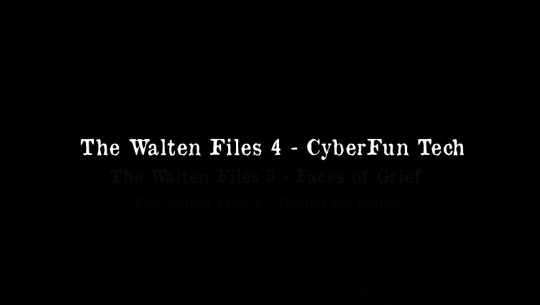
This is really all a single image, which appears like This if i copy/paste it from the website:
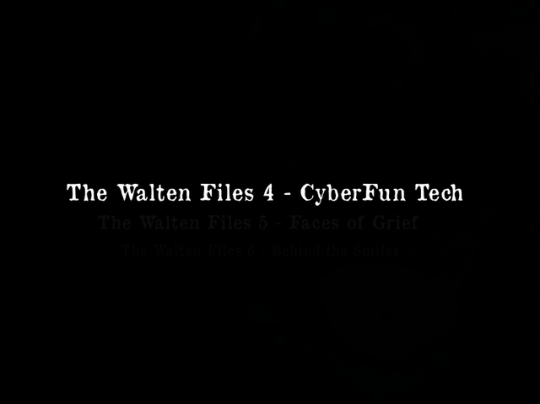
But if taken into a photo editing program and color-adjusted appears like this:
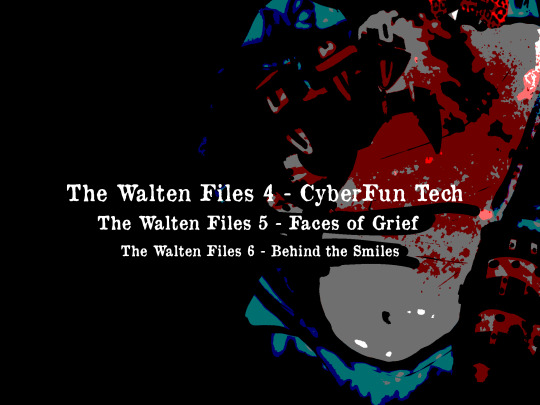
Hi Bon! And the titles of... the next three Walten Files episodes?
We get a better understanding of this when we take a look at Findjackwalten.com/name-me:
The first short part of this page is about the same, except the top text has changed to read "THE WALTEN FILES SEASON ONE (2020-2024)". Then the first three episodes are listed as they were, and then we see the new stuff
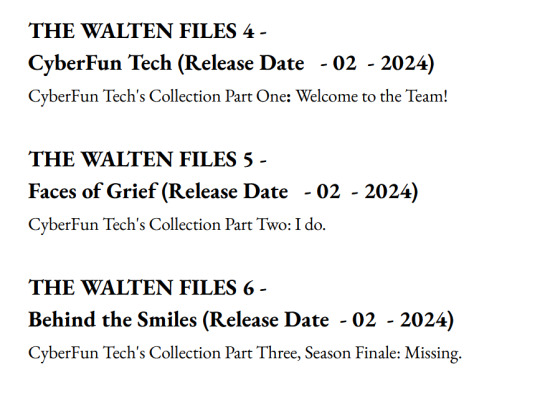
The three new episodes we'd seen before, subtitled as "CyberFun Tech's Collection"? It seems to me like The Walten Files 4 has been split up between three smaller, more manageably-sized videos. Considering TWF4 was estimated to be about an hour and 20 minutes long, I'm envisioning these new episodes to be within the 20-30 minute range, much more like TWF2 was.
Also importantly, it looks like the end of TWF4, now TWF6, is going to be the Season 1 Finale. This leaves the numbers the same, but the actual plot is different. Originally Season 1 was going to have a two-part finale revisiting Sophie and Jenny's narrative where we left off in BunnyFarm.
Speaking of, if you highlight all the text on the page, (ctrl+A is a help,) something new appears:

That all said, it looks like these next 3 episodes are all slated to release sometime in February? Which is exciting.
We also have some new tweets from Martin:
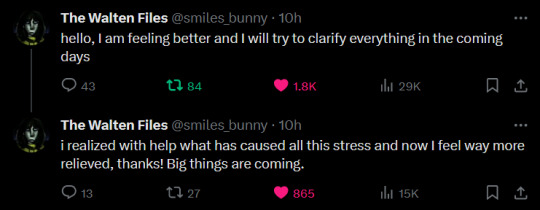
As well as some replies he left on some other people's tweets that give a little more context and explanation for everything:



I'm like, ridiculously excited, honestly? I think this was a really good decision for him to make. Pivoting to smaller episodes rather than really big theatrical ones is a really good move for him, I think. I also think this is going to be better for a lot of fans who were starting to feel like the ever-increasing scope and standard of the series was starting to feel kind of... cumbersome? I've seen more than a few people worried than an almost feature-length episode was going to feel really overwhelming.
So yeah. I think this was a good decision both to make The Walten Files more accessible for new and returning fans and to make it less of an incredible burden on its creator. And that's just a win-win to me. I'm so pleased.
52 notes
·
View notes
Text
Anon wrote: Hi mbti-notes, I am a INFJ in their late twenties. My purpose for this inquiry is to better understand, on a mbti-function level, why I am feeling emotionally overwhelmed and burnt out.
For additional context: I am currently in a graduate program that I detest—to the point where I’ve had to keep myself from crying at my desk in public. Usually, when I’m dealing with something arduous I can engage in some sort of Ni-led vision of what I want in the future to encourage myself to keep going. But lately I’ve just been so tired of trying to ‘inspire’ myself to keep moving.
On top of this, I feel like I can’t express my disdain for my work life to friends because they either work in the same field (and they enjoy it) or they are going through other issues of their own. In general, I find that people are (reasonably) concerned with their own sources of stress, and I don’t want to bother them about it again unless its serious.
Additionally, I have found it hard to meaningfully engage with such people about their own life. Instead of being attentive and curious about others’ lives, I now feel like I’m always thinking of my own problems. Is this because I am over-exerting myself (Fe) and not reflecting enough (Ni)? If it is a lack of Ni, then why do I feel so tired of trying to work with Ni (please see ’inspiring myself’ sentence earlier in my post)? Thank you so much for reading and considering my long entry—I really appreciate it.
----------------------
There are several factors that can contribute to burnout, so the solution will depend on which factors are most influential in your case. You'll have to reflect on it yourself and tailor the right solution. Possible factors include:
1) You are in poor physical health. Your body can only operate at peak efficiency if you eat well, sleep well, get enough exercise, and moderate stress. If you lack energy due to poor physical health, then you need to develop better physical habits.
2) You are expending more energy than you are generating. Ns often need to be reminded that physical and mental energy are finite resources. There is a limit to how much your mind and body can do every day. Everyone needs rest, relaxation, and recuperation time. This is especially the case for introverts. If your workload is too heavy, find a way to reduce it and/or schedule better. Proper work-life balance is necessary for making sure that you take enough time for yourself to recharge.
3) You are taking on too much. Are your work roles and responsibilities clearly articulated? Are you taking on tasks that don't belong to you or should be done by someone else? It's not uncommon for Js to be controlling and Ns to fear missing out, which means they end up doing more work than they should. If this is the case, you need to learn to manage your workload better by prioritizing, deferring, or delegating tasks more appropriately.
4) You are in a disadvantaged position and don't experience all the advantages of your peers. This can happen for a variety of reasons. For example, you might be experiencing overt or covert exclusion because of being a minority and not fitting in (due to class, race, gender, etc). Another example is that you have lower professional status than others, which you might be able to change through hard work and getting promoted to a higher position. Another example is that you haven't done enough to build professional relationships and aren't reaping those social rewards.
5) Your workplace is toxic. A workplace is experienced as unhealthy when you have unsupportive authority figures to contend with, overly competitive or undermining peers to watch out for, and/or unfair practices that don't reward people based on merit. When the social environment is toxic, you can try to improve the situation, or you can leave if you don't have the power to change anything. When leaving is not an option, try to limit engagement and increase positive engagement elsewhere in your life. The more time you spend in a toxic social environment, the more energy it will drain from you until you have no motivation at all.
6) You lack a healthy support system. You seem to downplay or ignore your own needs, which is a common INFJ issue. Yes, you should be professional when dealing with peers/colleagues in a workplace, so it's understandable that you don't want to be constantly discussing your personal issues with them. However, this raises the important question of why you don't have family or friends outside of school/work to lean on and get support from. It sounds like you're not doing enough to build a community for yourself, which leads to isolation and alienation, and eventually, depression that saps away your energy. Neglecting emotional and social needs means you're not taking care of your mental health and well-being. When you don't take care of yourself, you won't be able to attend to others.
7) You lack control and/or confidence. When people don't feel in control or don't feel confident enough to tackle their challenges, they're more likely to waste energy in feeling anxious, preoccupied, distracted, fixated on trivial matters, etc. If this is the case, you may need to be more assertive in: expressing your needs/wants and fulfilling them; organizing your environment to better suit you; clarifying your goals/aspirations; seeking help for improving knowledge and skills that would help you feel more self-confident.
8) You focus too much on the negative and discount the positives. Why is it that two people can work in the same environment but experience it completely differently? Part of it is due to perception. You don't like the work you're doing, so you are full of negative feelings and emotions that then cast everything in a negative light. If this is the case, you need to make more of an effort to recover the positive aspects of the situation. Looking on the bright side involves seeking out and realizing positive possibilities/potential, which should be easy enough with healthy Ni. Positives exist in the present, and you can create them in the decisions you make today. If you're always waiting for happiness to appear in a distant future, chances are, it's not real.
9) Your work doesn't seem to matter or get rewarded. Does this career align with your identity and values? It's hard to feel motivated when you don't believe in your work or others don't recognize your work. Does your work matter? Are there ways your work matters that you're not seeing and appreciating? If others aren't appreciating your work, have you done enough to show it off and keep people informed of your activities?
10) You are on the wrong life path. If you truly believe your work doesn't matter or isn't the right fit for you, why are you still doing it? Why aren't you listening to your own heart? This would constitute going against Ni, which is self-sabotaging. It sounds like you're using Ni-Ti to rationalize. Lying to yourself is only going to make you more and more miserable every time reality slaps you and debunks the lie. While it's true that it's not always easy to change paths, is it really harder than staying on the wrong path forever? I'm not telling you what to do but simply raising the possibility that you haven't done a proper reckoning of the path you've chosen and compared it objectively to the alternative paths that might be better suited to you. Remember that it's not foolish to make a mistake because mistakes are necessary for learning and growth. What's foolish is to deny a mistake and keep suffering from it for the rest of your life.
16 notes
·
View notes
Text
The Best Burnout Stress Management Program from Slow It Travel Can Help You Rejuvenate Your Health
Discover a holistic approach to stress relief with Slow It Travel's renowned Burnout Stress Management Program. Our expertly crafted program combines mindfulness, personalized counseling, and self-care strategies to empower individuals to overcome burnout. Take control of your well-being and embark on a transformative journey toward resilience and renewed vitality with Slow It Travel's exceptional stress management program. for more information contact us today at +39 351 505 5952.
0 notes
Text
𝐓𝐡𝐞 𝐒𝐢𝐥𝐞𝐧𝐭 𝐒𝐭𝐫𝐮𝐠𝐠𝐥𝐞𝐬 𝐨𝐟 𝐈𝐧𝐝𝐢𝐚𝐧 𝐂𝐡𝐢𝐥𝐝𝐫𝐞𝐧: 𝐖𝐡𝐲 𝐂𝐨𝐮𝐧𝐬𝐞𝐥𝐢𝐧𝐠 𝐌𝐚𝐭𝐭𝐞𝐫𝐬
✨ Ever noticed your child struggling with school stress, losing interest in activities, or withdrawing from social interactions? You’re not alone—millions of parents in India face the same concern but often don’t know where to turn.
💡 The reality? 1 in 7 children in India struggles with anxiety or emotional distress, yet most never receive the right support. Childhood should be about joy and learning, but increasing academic pressure, social expectations, and digital distractions are taking a toll on young minds.
👩⚕️ If you’ve noticed your child feeling overwhelmed, consulting Child Counseling Experts in India can be the key to their emotional well-being.

🚨 Common Mental Health Challenges in Children
📌 1. Academic Pressure & Performance Anxiety 📖 India's competitive education system creates intense pressure on children. This often leads to: ✔️ High stress levels & anxiety ✔️ Fear of failure & low self-esteem ✔️ Burnout & difficulty concentrating
📌 2. Social Anxiety & Peer Pressure 👥 Some kids avoid speaking in class, feel left out, or hesitate to make friends because of: ✔️ Fear of judgment & rejection ✔️ Struggles with self-expression ✔️ Low self-confidence in social situations
📌 3. Digital Addiction & Cyberbullying 📱 With kids spending hours online, new challenges arise: ✔️ Excessive screen time & gadget dependency ✔️ Exposure to cyberbullying & toxic online content ✔️ Struggles with real-world communication
📌 4. Emotional & Behavioral Issues 😞 Many children experience mood swings, anger issues, or emotional instability due to: ✔️ Anxiety & depression ✔️ ADHD or other attention disorders ✔️ Behavioral disorders like ODD
📌 5. Family Conflicts & High Expectations 🏡 Stress at home can deeply impact a child's emotional well-being. This includes: ✔️ Parental conflicts or divorce ✔️ Unrealistic expectations & strict discipline ✔️ Lack of emotional support
👉 If any of this sounds familiar, seeking help from Child Counseling Experts in India can help your child cope, heal, and thrive.
🧠 How Child Counseling Experts in India Make a Difference
👩🏫 Professional counseling isn’t just talking—it’s about healing, growth, and support. Here’s how expert Child Counseling Experts in India help:
🔹 Identifying Root Causes – Understanding the deeper struggles affecting your child’s emotions. 🔹 Teaching Healthy Coping Skills – Techniques to manage stress, anger, and anxiety. 🔹 Boosting Social & Communication Skills – Helping children overcome shyness, express themselves, and build friendships. 🔹 Strengthening Parent-Child Relationships – Guiding parents in providing emotional support & better communication.
💡 Early intervention can prevent lifelong struggles. The sooner you act, the brighter your child’s future.
💙 How Lyfsmile Supports Your Child’s Mental Well-being
At Lyfsmile, we believe that every child deserves emotional happiness and support. Our professional Child Counseling Experts in India offer:
✅ Personalized One-on-One Therapy – Tailored sessions to focus on your child’s unique needs. ✅ Group Counseling for Social Growth – Helping kids gain confidence in social settings. ✅ Parental Guidance & Family Support – Equipping parents with tools to understand & support their child. ✅ School-Based Mental Health Programs – Creating safe & emotionally supportive school environments.
✨ You’re not just choosing counseling—you’re giving your child the foundation for a mentally strong and happy life.
📅 Take the first step toward your child’s well-being today!
💬 FAQs
❓ How do I know if my child needs counseling? If your child is experiencing mood swings, anxiety, withdrawal from social activities, or academic stress, it’s time to seek professional support.
❓ Is counseling confidential? Yes! Counseling is 100% confidential to create a safe, trusting space for your child.
❓ How long does child counseling take? Every child is different. Some show improvement in a few sessions, while others may need longer-term support.
💭 Your Child’s Mental Health Matters!
🚀 Have you noticed any signs of stress in your child? What are your thoughts on child counseling? Let’s discuss in the comments! 👇
📢 Spread awareness by sharing this post—every child deserves support! 🔗 Book a Session Now with Lyfsmile! 📞 Lyfsmile is here to help. Whatsapp/Call +91 98047 91047 Gmail: [email protected] to get started.
#ChildCounseling#MentalHealthMatters#ParentingSupport#DwarkaSector8#GurgaonSector56#DLFPhase1#DLFPhase2#Lyfsmile
2 notes
·
View notes
Text
Employee wellness programs enhance productivity, efficiency, and reduce absenteeism by addressing employee stress and burnout. These programs, which include lifestyle changes, nutritional support, and mindfulness training, aim to improve overall well-being. Benefits include higher productivity, reduced absenteeism, increased employee morale, better recruitment, and improved retention. Programs like the Resiliency Program use a scientific approach to create personalized plans for resilience and burnout reduction, ensuring healthier, happier, and more motivated employees.
#resiliencyprogram#employee wellness#corporate wellness programs#stress management#Employee wellness#work life balance#employee burnout#Employee Happiness
0 notes
Text
The Spiral Within

Jacob Winters was a man of purpose. At 61, he had spent decades building a reputation as an unshakable workhorse, managing a sprawling corporate empire with a multi-million-dollar budget. His days began at dawn and ended long after midnight. Seven days a week, he juggled crises, placated demanding clients, and wrestled with numbers that never seemed to align perfectly. His peers admired his resilience, but Jacob could feel the cracks forming beneath the surface.
The signs of burnout were subtle at first. A forgotten meeting here, an uncharacteristic snap at a colleague there. Then one day, as he was walking through the towering building he managed, he noticed something out of place: a sleek, black cell phone lying abandoned on a bench in the lobby.
Jacob picked it up, intending to hand it over to security. The screen flickered to life at his touch, displaying a swirling, hypnotic spiral.

The colors shifted with a mesmerizing rhythm, and before he could think to look away, he was caught. His vision tunneled, his thoughts slowed, and an overwhelming sense of calm washed over him.
He blinked and found himself back in his office, the phone still in his hand. Shaking his head, he set it aside and tried to refocus on his work, but the image of the spiral lingered, vivid and intrusive. By the end of the day, he had convinced himself it was nothing. Yet, as he drove home, he felt an inexplicable pull to look at the phone again.
Over the next two weeks, Jacob’s life changed dramatically. The pull of the spiral became impossible to resist. He found himself staring at the screen for hours, losing track of time. The demands of his job became secondary. He started leaving meetings without explanation, disappearing in the middle of the day, and eventually failing to show up at all. His colleagues’ concerned calls went unanswered.
In the depths of his trances, a strange directive began to take shape: Find the Hive. Join Golden Army. Become Polo.
Jacob’s feet carried him to an unmarked warehouse on the outskirts of the city, a place he had never seen before but instinctively recognized.

Inside, he was greeted by others who wore sleek, black rubber suits with gold accents. They moved with an eerie synchronicity, their faces obscured by reflective black masks. They were the Polo drones.
Each visit to the Hive left Jacob changed. The first day, he returned home wearing gold dress shoes he didn’t remember putting on. The next day, a pair of black rubber slacks replaced his usual tailored trousers.

Day by day, piece by piece, his wardrobe transformed, mirroring the appearance of the drones at the Hive.

Gold gloves, a face mask that covered his mouth.

Finally a shiny black rubber polo shirt appeared in his closet as if by magic. His reflection in the mirror became unrecognizable.

As his outward appearance changed, so too did his mind. The spiral’s hold deepened, erasing the sharp intellect that had once defined him. He stopped questioning his actions. His thoughts were no longer his own. By the end of the second week, Jacob was no longer Jacob.

He stood in front of the mirror, his transformation complete. His body was encased in a shiny black rubber with gold accents. Tight, reflective gold gloves covered his hands, and gleaming gold boots adorned his feet. His face, once a testament to years of hard work and determination, was now a featureless, reflective gold surface. He was a Polo drone, programmed with only one responsibility to pleasure to his fellow drones. No more stress. No more worries.

Are you burning out? Let go of your stress and join us, contact @polo-drone-001, or @brodygold @goldenherc9
5 notes
·
View notes
Text


Improving the mental health of the working class is crucial for overall well-being and productivity. Here are some tips to help support mental health in the workplace:
1. Encourage work-life balance: Promote flexible working hours, encourage employees to take breaks, and discourage overtime to prevent burnout.
2. Provide mental health resources: Offer access to counseling services, mental health hotlines, and employee assistance programs to support those struggling with mental health issues.
3. Foster a supportive work environment: Create a culture of open communication, where employees feel comfortable discussing their mental health concerns without fear of stigma or discrimination.
4. Promote physical health: Encourage regular exercise, healthy eating, and adequate sleep to improve overall well-being and reduce stress.
5. Offer training and education: Provide mental health awareness training for managers and employees to recognize signs of distress and offer support.
By implementing these strategies, employers can help improve the mental health of the working class and create a more positive and supportive work environment.
5 notes
·
View notes
Note
Hi Mr. ENTJ, congrats on the new job offer. It's good to hear INTJ and Kobe & Co. are doing well, too.
I'm an ENTJ currently in my fourth year of my Computer Science PhD specializing in Machine Learning/Data Mining, and I know that you know how quickly this field moves. There's loads of advice about how "doctoral programs a marathon, not a sprint" and students need to pace themselves and have work-life balance in order to not burn out. Following these principles, I've made it this far unscathed (in terms of mental health deterioration) and managed to stay in my program.
With luck, an understanding advisor, and low amounts of admin work (emails, meetings-that-could-be-emails, etc.), and good self management, I have been able to work 40 hour workweeks for the most part and stay on track. That being said, I am currently in a period of time where I am increasing to 50 hour workweeks in order to meet a conference deadline at the end of June 2023 (time of writing is mid-late April 2023). As long as I show up to work every day and do my best, I expect this paper will be finished by the time my internship starts. This is fine by me; deadlines need to be met, and I want to continue with my current 5-year PhD trajectory (as opposed to taking longer).
Speaking candidly, I have ADHD and am also Autistic, and maintaining this 40hr/week is critical in preventing the "I wake up in the morning wondering if I've accomplished anything meaningful with my life" feeling that gets in the way of me doing very much at all with my day. I also notice that when I am in the *deep throes* of burnout, my ability to pull back and look at the bigger picture takes a nap and I make myopic, hasty decisions. It's a recipe for bad research.
I've relaxed my "good work-life balance" constraint to simply "do not enter the *deep throes* of burnout". My question is for what lies after this period of time: I will be entering a summer research internship. I am concerned I will not perform well at my internship and will not be able to study as hard for full time interviews as a result of my choices now. Any tips for optimizing this recovery time and post-burnout damage control? Is this an ill-posed question, and there is no way to have my cake and eat it too?
Thanks for your time and consideration, Mr. ENTJ.
You can have your cake and eat it too, you'll just need to endure for the next few months.
Some thoughts on your situation in no particular order:
Get therapy and medication for the ADHD and autism if you haven't already. Mental health issues should never be left untreated especially when you're attempting ambitious and difficult goals. It would be like trying to win a race with a broken leg.
Set strict guardrails to get adequate sleep and nutrition. Don't compromise on either of these two because it'll severely impact performance. During the most intense periods of my life, meal planning worked really well so I could grab and go healthy meals without long prep time. Poor health choices lead to low energy, brain fog, and bad moods. Healthy food/snacks, hydration, vitamins, exercise (even a quick 15 minutes of cardio when my scheduled was packed) made me 10x more effective.
Reach out to the summer internship team and learn more about expectations so you can start planning ahead to manage your time and prepare to hit the ground running. Most summer internships aren't time-consuming and energy draining to the point they'd grind you down to dust. This is because interns require a lot of time to onboard which cuts into the 3-month summer term and they have limited access to information, skills, and experience needed to do more complex work. I wouldn't jump the gun and stress about underperforming without knowing the full scope of your role and responsibilities.
Ensure that you have at least one person from your summer internship who can speak highly of you. In the unlikely event you don't perform well in your internship, you'll still walk away with a solid professional reference to use for future full-time job offers. Pro tip: Companies won't interview every single person at the internship even if you fuck up. As long as they can verify you worked there and you have at least 1 person (more is better) who can speak to your abilities, you'll be fine.
Prioritize full-time job interviews > summer internships if the summer internship has a low chance of conversion to a full-time role. If the opposite is true, reverse that order. If you need to prioritize one of these two, prioritize the one that secures your desired outcome.
Focus on outcomes over input. Focus on the things you achieve, the milestones you reach, and the obstacles you overcome-- not the amount of hours you put in. A few weeks ago I fixed a $5 million problem by clearing up a misunderstanding with a 90-minute conversation. This 90-minute conversation was way more impactful than the 40-50 hours of work I put in the previous week. There's that John Wooden quote: "Don't mistake activity for achievement." Benchmark your progress towards achieving a 'meaningful life' with impact, not input.
39 notes
·
View notes
Text
Resting and starting an apprenticeship.

(10/07/2023)
Hi everyone are you?
I hope well.
The last few weeks have been full of emotions for me, as I was preparing to take a test to enter an apprenticeship at a company in my country.
I again thought I wouldn't make it, mainly because this one is VERY DIFFICULT. But I PASSED. I passed the technical test and then did the interview.
If you followed my April or May posts, you saw how frustrated I was for being pathetic in an interview. So due to that experience, in this one I studied and even spoke in front of the mirror.
Fortunately, the conversation was very good, I knew how to give the right answers and captivate and I got my spot on the program.
This program will be 12 weeks learning react.js with the company's developers, team projects and if I get a +70 at the end I'll get a job.
So I thought it was a good solution to get a tech job by the end of the year.
I was about to have my 3rd burnout of the year so after I got accepted I just didn't take the code and didn't study anything and I think it was my best decision.
I'm not 100%, but I'm fine enough to make an effort and manage to do what needs to be done. They ask me to study 5 hours a week, so despite being afraid of not being good and the new, I think that by dedicating my days to study I can do well.
And I'm still finishing the front-end project classes I'm taking part in, but in this one I'm more focused on doing my 3 projects and getting the certificate. Fortunately I have until the 30/07th, so I'm fine.
Second, I was wondering whether to share it here or not. BUT besides wanting to look at my trajectory at the end of the year, I also want to show people that entering the world of technology is full of successes and mistakes, BECAUSE I AM HUMAN LIKE YOU.
I procrastinate, I get frustrated, I get stressed, I think about giving up and so on. Anyway, I'm going to share my routine and then I want to share the notes I take here on my linkedin for potential students in the next classes.
And you, how are your studies? I wish you all well, have a great week and see you tomorrow.
#womanintech#codeblr#software development#woman in stem#coding#studyblog#studyblr#software engineering#code#algorithms#learningReactJS-day1#apprenticeship#YoucanGirl
16 notes
·
View notes